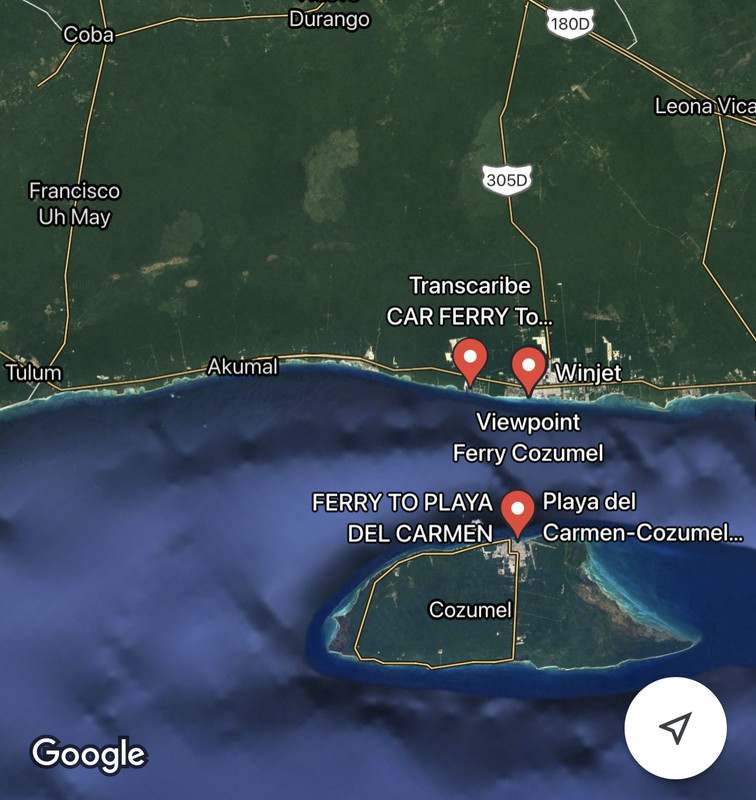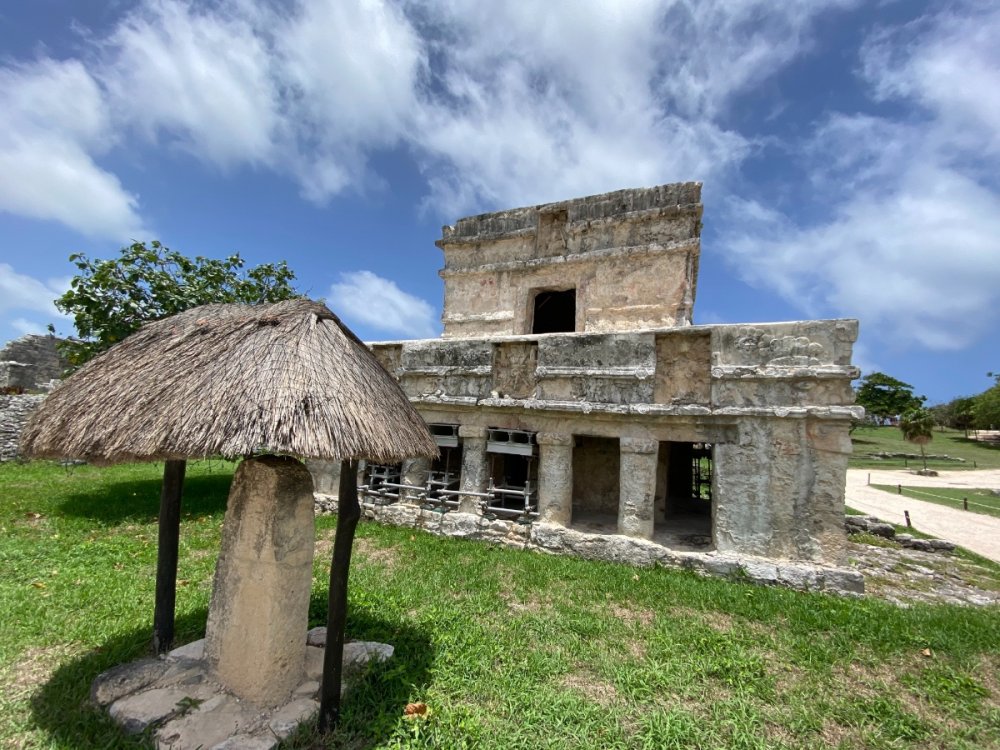Tulum Mayan Ruins
The ancient city of Tulum is uniquely situated on the water and closed off by a limestone wall on the other three sides. Tulum was once home to 1,500 Mayans and served as the major shipping port for the much larger city of Coba. If you are in Cancun or Playa Del Carmen, you can easily visit Tulum by taxi, bus, or collectivo.
If you are coming from Cozumel, you will need to take a 45 minute ferry ride to Playa Del Carmen. Ferries leave every hour. A roundtrip ticket costs $25 per adult and $17 per child. You can get more information on the ferry here.



Once you arrive in Playa Del Carmen, you’re going to be in their major tourist shopping district. If you want to go to Tulum by taxi cab, it will be easy to catch one in this area.
The cheapest form of transportation to Tulum is a shared van called a collectivo. A collectivo from Playa Del Carmen to Tulum should cost no more than 100 pesos or $5 per person. The collectivo station is under an overpass 3/4 of a mile from the ferry terminal. You could take a taxi to the station or it’s a straight shot if you want to walk it. You may even run into a collectivo along the way that will pick you up if you flag them down.


The downside to getting into a collectivo at the station is they will make every effort to fill it up before you leave. It wasn’t a long wait. One left filled just a few minutes before this one left filled. Most people on the collectivo will not be making the full trip. It won’t be long before they start dropping people off and the ride becomes more comfortable. They could always pick up some people along the way but it’s unlikely to be full.

If you are traveling from a resort between Playa and Tulum, you can flag down a collectivo on the street. They are all over the place. It won’t take more than a minute to find one. The cost of a ride from here should be no more than 50 pesos or $3 per person.


It’s a short walk to from where the collectivo drops you off to the ruins. I was told the only way to avoid the walk is to hire a tour guide that is allowed to drive to the ruins.


They have a line for temperature checks before entering.

They also have bathrooms before you go in.

The ticket line took about 15 minutes. There were tour guides offering you an opportunity to skip the line if you bought their tour.


Tickets are 80 pesos or about 4 dollars. There’s a sign saying you need Mexican currency and exact change. I only had 50’s so I gave them two and didn’t expect any change back.

They did give me change back despite the sign saying they wouldn’t.

They just punch a hole in the ticket at the entrance.

Tulum, originally called Zama (place of the dawning sun), is surrounded by a limestone wall on three sides and a cliff on the fourth side. It’s proximity to the ocean made Tulum a major shipping port between the thirteenth and sixteenth centuries.

At it’s peak Tulum was home to more than 1500 Mayans.




The Temple of Paintings is one of the best preserved buildings in Tulum.

The bottom floor consists of two temples with murals on the walls. The upper level contains another temple.

It is decorated with a sculpture of the descending god which we’ll see again later at the Temple of the Descending God.

Some believe the handprints on the outside of the building may be the signature of the architect.

Here are a couple of the streets in Tulum.

The houses built along these streets were mostly wooden with palm tree roofs. That is why you don’t see them here today.




The Temple of the Wind God sits alone on a cliff and was dedicated to the god of wind. It contains a single alter and was used for religious purposes. Pictures like this are why I wanted to visit Tulum. I was hoping for all blue water though.


You couldn’t get up to the Temple of the Wind God. It was roped off and there were workers up there.
The largest building at Tulum is El Castillo (The castle) which was used as a lighthouse.


Next to El Castillo is what is known as the Temple of the Stela. Stelae are stone monuments with humans, animals, or gods carved in them. A stela that is estimated to be 1300 years old was found in this temple.

This is the stela that was found in the temple. It is currently on display in a British museum.

This is the back of El Castillo which is the side that faces the ocean. The two windows are what was used for the light to shine through for ships to see.

If this guy falls off the cliff posing for a selfie on the other side of the rope line, I’m here to capture it.

The front of El Castillo has small temples on each side of it.


This is the Temple of the Descending God.

Above the door you can see the sculpture of a winged figure falling from the sky.

The Palace of the Great Lord is where the high priest and his family lived. It contains several large rooms with benches along the walls that are believed to be beds. In the back is a sanctuary for religious ceremonies.



The House of Columns may have originally been up to three floors high. It served as the residence for Mayan leaders.





This is the House of the Cenote. A cenote is a large sinkhole or cave that contains groundwater and rainwater.



The House of the Cenote has a room that was built over a hole that contained a cenote. This is believed to have been their water source. The room also contained bones so it may have been used as a crypt as well.


The exit is very similar to the entrance.


At the bottom of the trail you can go left to the beach or right to the exit. We’ll go to the beach first.


You don’t have to pay this tax unless you’re visiting a protected area. The public beach is not protected.




You can sit down anywhere and order drinks.




The ruins are visible from the beach.

If you go back down the road you came from it will take you back to the entrance.

Once you reach the main road you can flag down a collectivo for your return trip.

I love cheap private transportation.






















